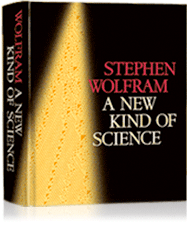‘A New Kind of Science’ is a decade old
Stephen Wolfram is celebrating the tenth anniversary of A New Kind of Science this year – but is anyone else?
Science promised nothing less than a revolution in the way we understand the universe. The complexity of the world around us doesn’t come from the elaborate calculus of theoretical physics, Wolfram argued – it comes from a few extremely simple rules. These rules interact with each other like lines of code in a basic computer program. That’s because the universe is, in some essential sense, just that: a basic computer program.
“I realized what I had seen was the beginning of a crack in the very foundations of existing science,” Wolfram wrote, “and a first clue towards a whole new kind of science.”
The book isn’t just about science. In the nearly 1,300 pages that follow, Wolfram touches on almost every topic imaginable – art, philosophy, religion and even the purpose of the universe. “What I do in this book goes significantly further than traditional science in getting rid of notions of purpose from investigations of nature.”
A mixed reception
Claims this ambitious don’t often appear in the measured discourse of scientific literature. But Wolfram’s no ordinary scientist. He earned his PhD from Caltech at age 20, and went on to create Mathematica, a software application used by scientists and engineers all over the world.
Perhaps that’s why Science garnered as much attention as any popular science book in recent memory. Wolfram earned reviews in major, mainstream publications including Newsweek and The Economist; he topped the best-seller lists for weeks.
Many reviews took a wait-and-see approach, giving Wolfram the benefit of the doubt.
“It will take months, even years, before all the thorough, independent professional assessments are in, which should not be surprising given Mr. Wolfram’s undertaking,” Edward Rothstein wrote for The New York Times.
The professionals were not entirely impressed.
“The strongest reaction I have seen by scientists to this new book has been outrage at Wolfram’s exaggeration of the importance of his own contributions,” physicist and Nobel laureate Stephen Weinberg wrote. Other scientists were less gentle.
“It’s remarkable how seriously a smart crank can be taken if he has a lot of money,” statistics professor Cosma Shalizi said.
Two charges appeared in most critiques of Wolfram’s book. A New Kind of Science was “A 35-Year-Old Kind Of Science,” as Jürgen Schmidhuber put it – a work of intellectual theft, full of unattributed ideas stolen from some of the most prestigious names in the history of the field.
And some of his ideas are simply wrong; Wolfram’s model of the universe can be reconciled with quantum mechanics or special relativity, for example, but it cannot be reconciled with both.
Neither problem would have survived the ordinary peer-review process that Wolfram skipped over by publishing the book himself, critics said.
Scientific ideas “stand up to the tried-and-true forum of peer review,” Steven Krantz wrote in the Bulletin of the American Mathematical Society. “With Wolfram’s ideas formulated and presented in their present incarnation, we will never know the true intrinsic merit of the work.”
A decade later
Ten years later, the critics have come out ahead. Science class textbooks still give credit to pioneers including Alan Turing and Konrad Zuse for much of what appears in Wolfram’s book. And physicists still rely on complicated models rather than simple cellular automata (Wolfram’s computer program of choice) when studying the universe. If “the real point of his book is to bring about a certain paradigm shift” in the sciences, as Rudy Rucker wrote, then Wolfram has yet to succeed.
Still, Stephen Wolfram remains one of the most well-known figures in the field. Every year, students from around the world attend his New Kind of Science Summer School – recently renamed the Wolfram Science Summer School – to work on projects related to his book. And in 2007 Wolfram released what he calls Science’s “first killer app”: Wolfram|Alpha, a search engine that uses algorithms developed with methods described in his book.
Most applications of the book “will probably take decades to emerge,” Wolfram wrote in 2002. But for Shalizi, a decade of A New Kind of Science has been more than enough.
“My impression is that there is a consensus, and pretty much has been since it came out, which is that it’s a waste of time,” he said.
(Feature photo by Jurvetson.)
Jacob Fawcett is an editor at the Baltimore Post Examiner.


